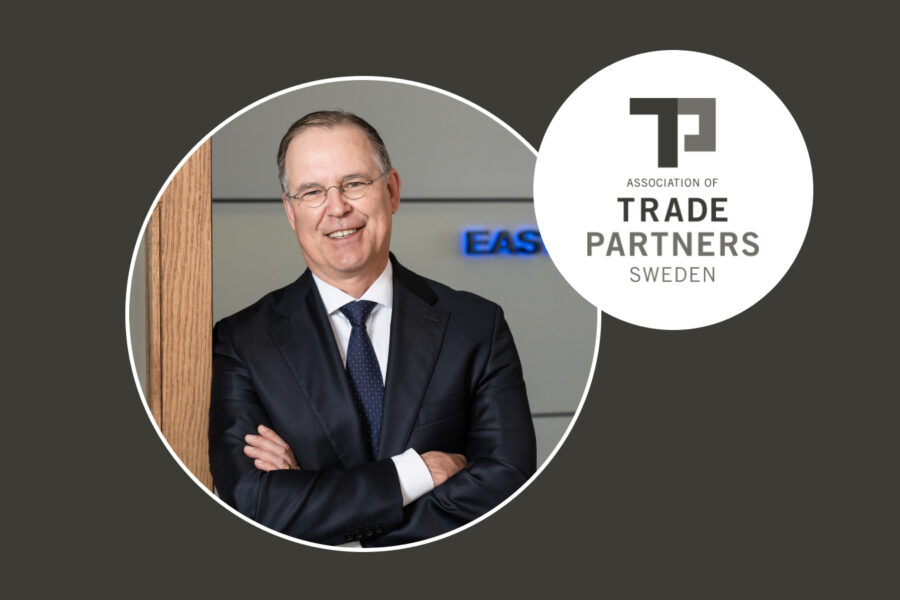
Trade Partners’ experts: Here are the members’ most frequently asked questions in finance – and Anders Borg answers
In the coming months, we will delve deep into the Trade Partners membership benefits. Our experts share their insights in logistics, legislation, and financial support, first out is the interview with Anders Borg.
Anders Borg is former Swedish Minister of Finance and currently investor, advisor, and board executive, including Senior Advisor, to East Capital Group and owner and member of the business advisory board of Hjerta.
– East Capital Group is a global asset manager based in Sweden since 1997. We offer a range of investment solutions within equities, fixed-income securities, real estate and alternatives. The essence of our business is not only to find attractive investment opportunities but also to work to drive positive change, influencing industries around the world to become more sustainable. We have a broad range of international investors including leading institutions, companies and private individuals, he explains.
What are your special areas?
– My expertise include global macroeconomic, political, and social trends and further, fiscal policy, international markets, and the intersection of economics and geopolitics. My work emphasises entrepreneurship and innovation as drivers of economic growth.
What can you help a Trade Partners member with?
– Through my advisory work with both East Capital Group and Hjerta, I provide strategic guidance for navigating complex economic landscapes and market dynamics to find the best solutions, whether that be Hjerta’s insurance or financial advisory solutions or one of East Capital Group’s many investment strategies.
– Hopefully, I can bring some confidence in an ever-changing economic environment, especially when it comes to investments. Financial markets are always early in adjusting to both good and bad developments and therefore being consistent and adopting a clear strategy, together with your financial advisor, is a good starting point.
– I’m part of Trade Partners’ extended network and participate at events such as when I recently spoke at the Stockholm Fashion District. There, and on social media such as LinkedIn, I readily share insights related to geopolitical factors to aid in assessing risks and opportunities associated with various regions and markets. More specifically, when relevant, on changes in regulations, tariffs, and trade agreements. I am always keen to ensure Sweden’s entrepreneurs remain competitive in the global market.
What are the three most common questions that these member companies ask you?
– This past year there have been two questions on everyone’s lips; where are we on inflation and what about interest rates? These are quickly followed up by questions related to the strength of the Swedish Krona and the consumer confidence index.
What do you answer them?
– I think interest rates are gradually coming down. Central banks will start to cut rates during the summer and eventually the banks will also lower mortgage rates and other loans. When the economy gradually recovers, the banks will be less worried about credit risk and more willing to lend to small and medium-sized companies, Borg shares. He continues:
– The Krona could remain weak. The Swedish Riksbank will cut as much as the European Central Bank and that will take the wind out of the sail for the Krona. Eventually, when the global risk appetite comes back, the Krona could gain some ground, but don’t have too much hope.
– I think consumer confidence will recover in Sweden. Unemployment is low, inflation is coming down and the government will continue to cut taxes and increase spending. For 2025 the outlook is starting to look more optimistic but think more in terms of a moderate recovery than a swift bounce back.
– Regarding rents, don’t be too worried as occupancy is under pressure due to hybrid working models and weak consumer sentiment with effects on retail properties.
In the financial landscape, what’s the most important subject in 2024?
– In my view, the worst for retailers is hopefully behind us, and the climate going forward will be brighter. Retailers have faced significant challenges recently, likely due to economic downturns, shifts in consumer behaviour, or other disruptions. However, I believe conditions may be improving, creating a more positive environment for retailers ahead.
– This optimism may stem from factors such as economic recovery, stabilisation of supply chains, or a return to more typical consumer spending patterns. Additionally, there is potential for retailers to innovate and adapt to new market demands, which could lead to improved performance and resilience in the future. For entrepreneurs, this could be an opportune time to explore new business ventures and bring fresh ideas to the market.
– All in all, expect most parameters to converge to a more normal economic environment, everything from inflation and rates to end demand. If correct, the drivers for success are once again product offering, quality, and competitiveness rather than external factors.


